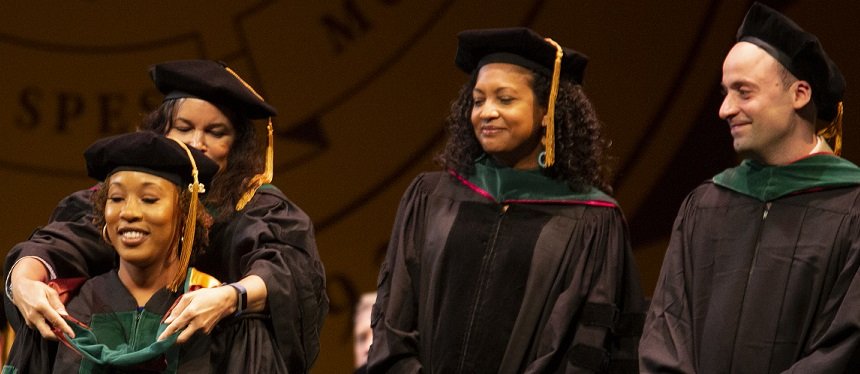BRiDGES Research Program
BRiDGES Research Program
Bachelors Rising in the Doctorate Gateway to Enrichment and Success (BRiDGES) Program
BRiDGES is an enrichment program that aims to promote the participation of historically racially and ethnically underrepresented undergraduate students interested in pursuing doctorate degrees, and ultimately, careers in academia. Students with majors in the following colleges are eligible to apply: College of Humanities & Social Sciences, College of Science & Mathematics and the Henry M. Rowan College of Engineering. All students who wish to enhance the advancement of these groups in academic careers are encouraged to apply.
Students in the BRiDGES program receive the following:
- a 10-week Spring and/or Summer Research Experience,
- research or professional mentoring,
- funds for students teams to travel to conferences to present research,
- participation in on-campus meetings and seminars to educate students on various topics related to careers in academia,
- “wrap around” student support,
- the opportunity to present at a research poster session in June 2023 and
- a paid stipend.
To apply, complete this Google Form by DUE DATE: https://forms.gle/J8k3BzbXQwkF8rEDA. Applications close on February 10th by 5:pm EST.
Project opportunities include:
- Dr. William Carrigan, History, "Research on the History of Lynching, 1877-1882"
- Dr. Chanelle Rose, History, "Examining Black Conservative Viewpoints in 1960's America"
- Dr. Jessica Mack, History, "Following the Construction Progress of Mexico's National University in the 1940's and 50's"
- Dr. Kelly Duke-Bryant, History, "Discipline, Order, and Colonial Childhoods in Senegal, 1848-1940"
- Dr. Kirti Yenkie, Chemical Engineering, "Sustainable Chemistry, Process Synthesis, and Life Cycle Inventories via Machine Learning"
- Dr. Islam Mantawy, Civil and Environmental Engineering, "Developing 3D-printed Versions of Ultra-High Performance Concrete using Locally Available Materials for Military Applications"
- Dr. Cheryl Bodnar, ExEEd, "Utilizing a Digital Process Safety Game to Determine the Gap between Ideal Process Safety Decisions and the Actual Decision"
- Dr. Cheryl Bodnar, ExEEd, "Establishing a Literature Basis for the Definition of the Entrepreneurial Mindset"
- Dr. Paromita Nath, Mechanical Engineering, "Investigating the Process-Structure-Property Relationship in 3D-printed Composite Parts"
- Dr. Uma Thayasivam, Mathematics, "Predictive Analytics and Statistical Modeling"
- Dr. Subash Jonnalagadda, Chemistry and Biochemistry, "Design and Development of New Anti-Cancer Drugs"
- Dr. Sam Lofland, Physics, "New Processes to Convert Atmospheric Carbon Dioxide into Raw Materials to Eliminate Dependency on Petroleum"
- Dr. Rashanique Quarels, Chemistry and Biochemistry, “The project will study of the synthesis of 1,4-benzodioxanes using visible-light photocatalysis. After a training period, the undergraduate student will design, run, and work up synthetic experiments. The student will perform purification techniques on crude mixtures, will analyze the products isolated using NMR, IR, MS, and other characterization techniques."
- Dr. Matthew Farber, Biological and Biomedical Sciences, “Students who join the Farber Lab will take part in the Yeast Hunters Project. Here, students isolate, identify, and characterize wild yeast with the potential to find novel species. Our current focus is on the discovery of yeast capable of producing low/non-alcoholic beverages like alcohol-free beer, wine, and kombucha.”
- Jonathan Lassiter, Psychology, “There is a lack of research about parental socialization that queries the types and impact of parental socialization for emerging adults (ages 18 - 25) with intersecting marginalized identities (e.g., race, gender, sexual orientation). Furthermore, most research about parental socialization is often conducted from a Eurocentric perspective that focuses on deficits. The student will serve as a research assistant. Duties will include recruitment, screening, qualitative interviewing, and data management. The student will be integrated into the existing SPIRiT Lab and be expected to participate in weekly meetings from 9am to 10:30am on Fridays. They will also be expected to attend the lab's Afrocentric Psychology Reading Group every other Friday from 12pm to 1pm to learn about the African-centered psychological theories that inform the project.”
- Dr. Jason Heindl, Biologica, and Biomedica Sciences, "Developmental processes in the bacterium Agrobacterium tumefaciens. These processes contribute to pathogenesis of the organism towards host plants"




